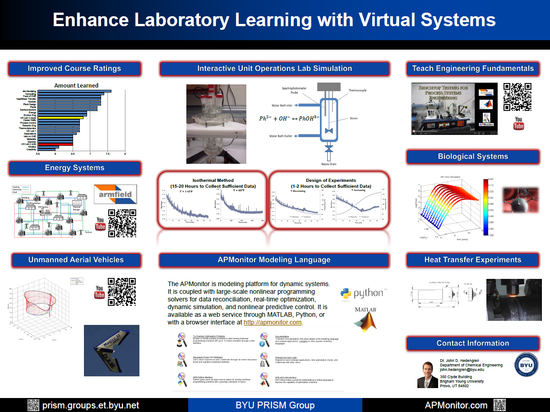Gekko Optimization Suite

GEKKO is optimization software for mixed-integer and differential algebraic equations. It is coupled with large-scale solvers for linear, quadratic, nonlinear, and mixed integer programming (LP, QP, NLP, MILP, MINLP). Modes of operation include data reconciliation, real-time optimization, dynamic simulation, and nonlinear predictive control. The client or server is freely available with interfaces in MATLAB, Python, or from a web browser.
Gekko Documentation | Gekko Tutorial Applications
GEKKO is a high-level abstraction of mathematical optimization problems. Values in the models are defined by Constants, Parameters, and Variables. The values are related to each other by Intermediates or Equations. Objective functions are defined to maximize or minimize certain values. Objects are built-in collections of values (constants, parameters, and variables) and relationships (intermediates, equations, and objective functions). Objects can build upon other objects with object-oriented relationships.
The APMonitor executable on the back-end compiles a model to byte-code and performs model reduction based on analysis of the sparsity structure (incidence of variables in equations or objective function) of the model.
The GEKKO Optimization Suite paper was selected as a 2020 Best Paper by the journal Processes. This is one out of about 1500 papers published by the journal that are awarded based on metrics for impact and citations.
APMonitor Optimization Suite
The APMonitor Modeling Language is optimization software for differential and algebraic equations. It is coupled with large-scale nonlinear programming solvers for data reconciliation, real-time optimization, dynamic simulation, and nonlinear predictive control. It is available as a free web service through APM MATLAB, APM Python, or with a web browser interface. A technical description of the algorithms used in APMonitor is given in the following reference:
- J.D. Hedengren, R. Asgharzadeh Shishavan, K.M. Powell, T.F. Edgar, Nonlinear Modeling, Estimation and Predictive Control in APMonitor, Computers & Chemical Engineering, 2014. Publication Link
New developments include improvements to large-scale Nonlinear Programming (NLP) solvers, parallelization of algorithms, new ways to visualize optimization solutions, multi-agent control architectures, and improved data reconciliation.
Additional information and tutorials are found in archives of the User's Group Seminar or in the APM Documentation. Another source of support is the APM Google Group Discussion Forum. Forum members include graduate students, industrial sponsors, interested observers, and others interested in optimization and control technology.
